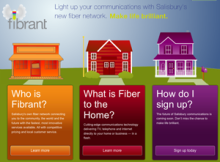Chelan PUD in Washington Reconsiders Broadband Stimulus Grant
For the last 6 weeks in Chelan, Washington, the Public Utility District has had to make some hard decisions regarding expanding its rural FTTH network using a broadband stimulus award from the federal government. Chelan was an early pioneer of rural FTTH, operating a network that serves over 2/3 of a rugged county that offers great rock climbing and hiking opportunities (I checked it out personally).
As we reported last year, Chelan's citizens had strongly supported accepting the stimulus award and paying for their required match by modestly increasing electrical rates (which are among the least expensive in the nation).
At that time, the PUD believed its network passed over 80% of the county. But after reassessing their coverage and changing the leadership of the group in charge of the fiber-optic aspect of the utility, they found the network passed closer to 70% of the population. They also re-examined assumptions about the cost of expanding the network's reach:
The PUD’s financial review resulted in a series of revised statistics that PUD engineers presented to commissioners Monday. Of the county’s 43,000 premises — mostly homes and businesses — 30,000 have access to fiber. Some 6,000 don’t have access because they live in areas where hookups are more costly, despite their often urban settings. In these areas, the cables that supply electricity are buried directly in the ground. Fiber hookups require costly trenching and installing conduit. Another 7,000 premises don’t have access because they’re very rural. Fiber access to all but the most rural of these locations will be funded jointly by a $25 million federal stimulus grant and PUD matching funds of about $8 million.Of the 30,000 with access, some 37% are taking a service (though they have to subscribe through independent service providers that contract with Chelan PUD due to Washington State law denying the opportunity for PUDs to offer retail services on their own network. Nonetheless, they are signing up 100 new customers per month. The problem is that some of the new connections are in high cost areas (whether due to distance or underground utilities).



